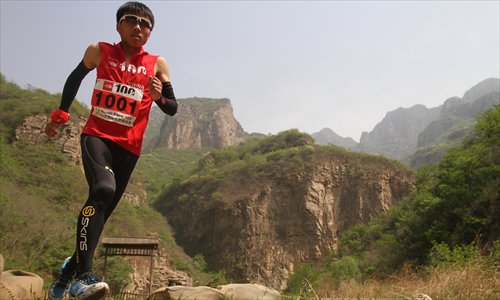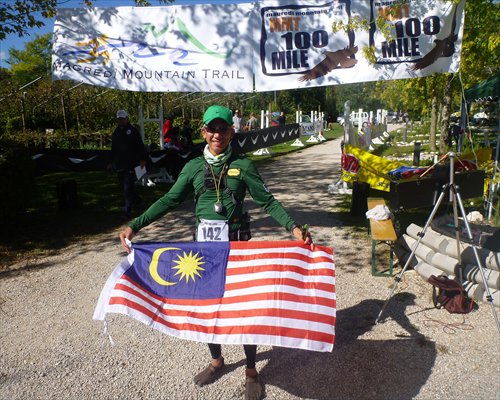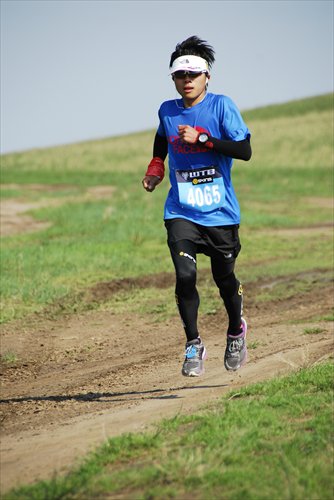Going the distance

Yun Yanqiao, a professional ultramarathon runner based in Beijing, competes in the 2012 North Face 100 Beijing International Endurance Challenge in Changping district. Photo: Courtesy of Yun Yanqiao
Shi Yanxiu felt dizzy and her legs ached. Voices crept in her head and she was beginning to hallucinate. As she watched the sun sneak above the horizon over Discovery Bay near Hong Kong's New Territories, she passed a checkpoint indicating she had run 50 kilometers. Shi's instincts urged her to stop, but she knew she had to press on and finish the TransLantau Ultramarathon - even though she was only at the halfway point.
"I felt that my legs didn't belong to me anymore. Every nerve felt numb, and I wanted to collapse right there and then to sleep," said Shi, a semi-professional runner who also works as a sportswear store manager.
The 100-kilometer race kicked off at 11:30 pm on March 14. The late starting time was to allow runners to cover the easier road sections at night and tackle hazardous mountain trails at daytime.
Shi, 29, finished the race in 30th place among a field of more than 500 runners from 23 countries and regions. She clocked a time of 26 hours and 2 minutes, well outside her personal best of 9 hours and 8 minutes achieved in Beijing on flat, less challenging terrain.
"When I reached the Mui Wo checkpoint [roughly halfway in the race], I cried out that I would never compete in another ultramarathon race in my life," said the native of Nanjing, Jiangsu Province. Her mind changed shortly after the race, however, after she showered and enjoyed a well-earned sleep.
Ultramarathons represent the ultimate test of endurance for runners. Races are longer than the conventional marathon distance of 42 kilometers, and either cover a specified distance or time. Although the sport has grown in popularity in China in recent years, the vast majority of runners are amateurs. If they compete overseas, most do so at their own expense.
A handful of Chinese ultramarathon runners have excelled on the sport's international circuit, but the dream of professionalism made possible by sponsorship is an elusive one for most athletes.

Shi Yanxiu runs against a mountainous backdrop in Mentougou district, Beijing. Photo: Courtesy of Shi Yanxiu
Profile of sport in China
Shi, who has competed in ultramarathons for five years, has blunt advice for anyone thinking about taking up the sport. "Don't try it unless you have a good understanding of what you're getting into, otherwise you'll end up addicted," she laughed. "When you get into the habit of running and gradually increase your distances, your brain releases endorphins that make you fall in love with the thrill of the race."
Aside from physical and mental toughness, many ultramarathon runners need to be able to endure inhospitable terrain ranging from scorching deserts to freezing alpine environments in races that can last days.
On February 23, the fourth annual Fuzhou 12-hour Ultramarathon was held at the Olympic Sports Center in the coastal capital of Fujian Province. Sponsored by the Chinese Athletics Association, the race attracted 159 competitors from across the country.
The four other prominent Chinese mainland ultramarathons are the Qiandongnan International Ultramarathon in Guizhou Province; the Hangzhou Ultramarathon in Zhejiang Province; the Yishan Ultramarathon in Shandong Province; and the Mentougou Ultramarathon in Beijing. All are held over a distance of 100 kilometers.
Major ultramarathon races in China are primarily funded and organized by local groups, but there is tacit support from authorities. "Some local governments invest in these races because they boost tourism," said Wang Xigu, a spokeswoman for the Chinese Mountaineering Association, which organizes the Yishan race.
China's premier ultramarathon race is the Soochow International 24-hour Ultramarathon held every December in Taipei, Taiwan. First held in 1999, the race stands out as the only one in China recognized by the International Association of Ultrarunners, the sport's global governing body.

Malaysian Seow Kong Ng celebrates completing his first 160-kilometer race in the 2011 Magredi Mountain Trail. Photo: Courtesy of Seow Kong Ng
Running into danger
In addition to paying a registration fee, runners must also have previous experience competing in ultramarathons before being allowed to register in major races. Competitors in the TransLantau Ultramarathon had to have either ran in a 100-kilometer race or completed a 50-kilometer race in under 12 hours within the past two years.
This requirement is to limit competitors' risk of serious injury or death, which is a growing concern in long-distance running in China. In 2004, two runners died in the Beijing International Marathon. The 2012 Guangzhou Marathon in Guangdong Province was marred by the deaths of another two runners. The most recent tragedy occurred on March 31, when a 25-year-old woman died 18 kilometers into this year's Suzhou Marathon in Jiangsu Province.
The world's toughest race is arguably the Badwater Ultramarathon that passes through Death Valley in California. The 217-kilometer race only accepts runners who have completed at least three 168-kilometer races.
Seow Kong Ng, a 48-year-old Malaysian of Chinese descent, ran the 2012 Badwater Ultramarathon. "I was already a seasoned ultramarathon runner. I had no problem running at Badwater," said Ng, who has completed six races each at least 168 kilometers long.
As an amateur, Ng covers expenses such as travel and race registration fees out of his own pocket. Shi covers most of her race-related expenses, but said she has "limited support" in the form of sponsorship from Japanese sportswear brand Mizuno.

Kevin Lin indulges in a lighthearted moment during SuperRace, an ultramarathon in Kenting, Taiwan. Photo: Courtesy of Kevin Lin
'Fearsome four' series
The biggest challenge for any ultramarathon runner is dealing with various stages of fatigue throughout a race, said Ng. "Normally, the second night of a race is when you have to deal with sleepiness," said Ng, whose solution is to take a nap of between 15 and 20 minutes to stay alert.
Shi's secret to staving off tiredness is to snack on sodium- and potassium-rich foods as well as caffeine tablets that she credits with boosting endurance and preventing cramps.
China's biggest celebrity in the ultramarathon world is Kevin Lin of Taiwan. His achievements include being among a team of three runners to cross the Sahara Desert on February 21, 2007, and conquering the 4 Deserts Race Series, dubbed "the ultimate test of human endurance."
The series comprises the Atacama Crossing in Chile, regarded as the driest place on Earth; the Gobi March across the namesake desert in Northwest China; the Sahara Race in Egypt, in the world's hottest desert; and the Last Desert in Antarctica, where temperatures can be as low as -20 C.
Runners who compete in the series have to do more than just pay a registration fee and prove their experience; they also have to pledge to cover costs of repatriating their body if they die during competition, as happened in 2010 to a Shanghai runner in the Gobi March.
"It sounds horrible, but the odds [of dying during a race] are low if runners prepare well," said 37-year-old Lin, who trains at the scenic Haigeng Park in Kunming, Yunnan Province.
"It is natural for runners to feel unwell during an ultramarathon. Most successful runners take the toughest paths in achieving their goals."
As the champion of the Vibram Hong Kong 100 Race held January 24-25 and a veteran of eight ultramarathon, Yun Yanqiao is one of the top names in the sport in China.
"Changing between uphill and flat road surfaces throughout a race requires runners to appropriately adjust their running technique to avoid injury," said Yun, who has had trouble in the past with his knees.
When running downhill, Yun bends his knees to ease pressure on his joints.
Injuries are an inevitable reality of ultramarathon. Shi once fractured her ankle during a race, which she said brought home the importance of running within your limits.
"Apart from wearing proper clothing, it's vital to run with a backpack containing supplies, such as food, water and first-aid. You must receive timely medical treatment if racing in a remote environment," she stressed.

Yun Yanqiao runs in the 2012 Grassland Extreme Marathon held in the Inner Mongolia Autonomous Region. Photo: Courtesy of Yun Yanqiao
Rewards on the trail
Aside from the personal satisfaction associated with pushing one's self to the limit, another perk for elite ultramarathon runners is the stunning scenery that serves as the backdrop of their sport.
Lin's most recent race in June 2013 saw him run 2,400 kilometers over 40 days - or 60 kilometers daily - from Mongolia to Gansu Province. Senegal, Libya, Turkey and Iran are among a handful of countries Lin has traversed in his quest to be among the world's best ultramarathon runners.
"I appreciate admiring diverse scenery in different areas. My journeys might be defined as ultramarathons, but I prefer to think of them as expeditions," he said.
Most regions Lin has run through in the world face the common grave problem of suffering a shortage of drinking water. This observation inspired his passion for environmental sustainability, with the star athlete a supporter of the H2O Africa Foundation and other charitable campaigns to improve the health of poverty-stricken people in undeveloped countries.
Despite intense competition between runners in ultramarathon, Lin said competitors should just run their own race. "Don't worry about competing against others. The secret is to just do your best and face your fears," he offered.